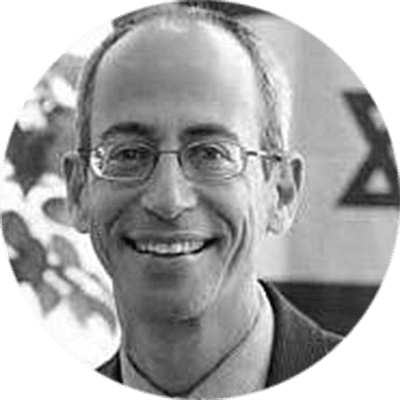It would be wrong to say that God is ignored in Jewish schools. God takes center stage in the core texts we teach—the creation story, the call of Abraham, the plagues in Egypt, the revelation at Sinai. What we can say is that although we talk about God redeeming the Israelites from Egypt, we don’t discuss if we have ever experienced a redemptive moment in our own lives. We teach Maimonides’s Thirteen Principles of Faith but don’t ask students about their principles of faith. We discuss theological propositions, “beliefs that…,” but not our personal commitments, “belief in….” We seldom share much about our inner spiritual lives or open the floor to our students’ relationship with God.
Spirituality gets little traction for many reasons. We might believe Judaism is nothing but a system of mitzvot, rules, and rituals—a religion of deed over creed. Or, we might find it easier to discuss something tangible such as adherence to a code of practice, than a topic more abstract such as our relationship or partnership with the Kadosh Baruch Hu.
Yet, children naturally wonder whether God exists, whether God is good, and what difference it makes if we believe in God. They are troubled by the presence of evil, perplexed by the relationship between science and religion, and curious to know if their life matters. Students likely ponder these questions more often than they think about a comment by Rashi or a sugya in the Talmud that is taught in school.
If Judaism is a response to existential questions, which I believe it is, then we must validate our students’ questions, interests, and curiosities and create a context to discuss them.
Where can educators begin?
First, we should acknowledge that schools are mostly about knowing something, whereas spirituality is about feeling or experiencing something. If you were to ask students if they believe in God, a certain number would say they don’t. But if you ask the same students if they’ve ever felt close to God, even some deniers would say they have. And they would point to an experience that likely took place outside of school and even outside of the synagogue. It was on a lakefront at camp, or at the Kotel in Jerusalem, or on a mountain top in Arizona.
While these are episodic events that don’t necessarily generate a regular, ongoing sense of being in relationship with God, it does suggest that we would be wise to incorporate or expand experiential education into the formal curriculum of the school. For, experiencing mystery and wonder has the potential to nurture the inner world of our students.
A second point relates to language. Someone once suggested that we should think of mitzvot more than as commandments; they are opportunities to develop our inner soul and our relationship with God. Religious life isn’t a set of duties or actions to perform but opportunities to enjoy, to connect.
I often daven Mincha in the building where I work. For the men in this particular minyan, they aren’t checking off some Divine checklist of chiyuvim, obligations. They are checking in with God. They are grabbing the opportunity to hold a conversation with God. I see it in the way they gesticulate with their hands, in the way they raise their voice and lower it, how tightly they close their eyes, and how they take their time. For them, observance is more than a sign of obedience; it’s an opportunity to deepen their relationship with God.
A final way we can help students grow spiritually relates to honesty about our own doubts and questions. We often feel that if we share with students our disappointments, uncertainty, or ambiguity about God, at best, we are oversharing the personal, and at worst, we fear it’s pedagogically dangerous because disclosing the vicissitudes of our journey may weaken our students’ ability to cultivate a relationship with God. But, since the Torah doesn’t hide our Israelite ancestors’ struggles and questions from our students, we have the license to share ours.
Yaakov has a dream of angels ascending and descending a ladder and comes to understand that God is with him wherever Yaakov may be. Wracked with uncertainty, Moses asks to see God directly (Exodus 33:18). Filled with doubt about whether or not God exists, the Israelites doubt God’s ability to rescue them at Sea, think it’s better to turn back to Egypt than forward to Canaan, and worship a golden calf. If our holy ancestors held doubts, felt insecure, were ambivalent about Godת and sometimes lost faith in God, why would our students expect anything other than that from us? Honesty validates our students’ uncertainty, and uncertainty is what leads human beings to new discoveries, both scientific and spiritual.
A relationship with a power beyond ourselves can cultivate gratitude and humility, imbue us with a sense of responsibility and accountability, and nurture awe, wonder, and mystery about our existence and the small hints that point to the Divine. Being in a relationship with God impels us to think about where we are today and where we are headed in the future, and for what end. It changes the way we see ourselves and how we perceive the world around us and can fill our lives with a greater sense of meaning and purpose. Shouldn’t our students enjoy those gifts as well?

Rabbi Lee Buckman lives and works in Jerusalem. He heads up the unit in the Israel office of the Holocaust Claims Conference that funds education, research, documentation, and films related to the Shoah. As well, Lee is the Executive Director of JEDvision, which provides educational services, consulting, and executive coaching to Jewish organizations and institutions globally. Prior to making aliyah, he served as Head of School at three institutions: TanenbaumCHAT, the Greenfield Hebrew Academy, and the Frankel Jewish Academy. Lee has been a Lookstein Center contributor for more than 10 years. He can be reached at lee@jedvision.com.

